Mercados
Al diseñar una intervención humanitaria y decidir si se utilizan los PTM, el análisis de mercado debe ser parte del análisis global de la respuesta. Se ha demostrado que apoyar a los mercados para que funcionen bien conduce a una recuperación más rápida y a una mayor resiliencia en zonas afectadas por desastres.
Muchas organizaciones han invertido en el desarrollo de herramientas de apoyo para el análisis de mercado y están considerando la programación basada en el mercado de forma más integral. Esto incluye intervenciones que utilizan los mercados (como las transferencias en efectivo a poblaciones afectadas), así como intervenciones que apoyan directamente a los mercados (como subvenciones condicionales a los comerciantes para recuperar su mercado y mantenerlos funcionando).
Iniciativas relacionadas
Contenido destacado

Introduction to Market Analysis
Curso
This 30 minute online course provides an introduction to the analysis of markets in emergency contexts, with input from some of the world’s leading thinkers on the topic.

A Practical Guide to Market Analysis in Humanitarian response
Curso
A three to four hour online course designed to provide future humanitarian market assessment team members with a solid understanding of theory and steps of market assessments so that they can join assessment teams prepared with a basic understanding of what they will be doing and why.
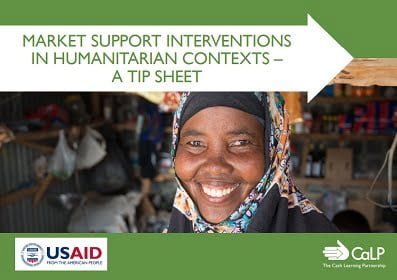
Market Support Interventions in Humanitarian Contexts – a Tip Sheet
Guidelines and Tools
This tip sheet defines what market support programming in humanitarian contexts is, and what it can look like in practice. It enables humanitarian practitioners to systematically consider market support interventions alongside other programme activities. The scope includes support interventions focusing on supply/availability and on demand/access. The tip sheet is based on secondary data...
Líder temático
Últimos recursos
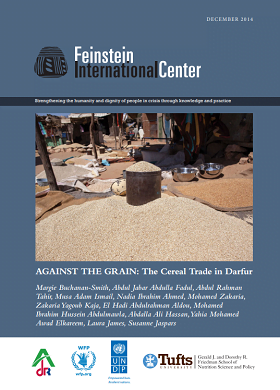
Against the Grain: The Cereal Trade in Darfur
Report
WFP began to pilot food vouchers in Darfur in 2010 as an alternative to general food distribution. The main purpose of the voucher program is greater cost-efficiency for WFP, increased choice for beneficiaries, and strengthening of markets. It is also expected to create market multiplier effects and...

Cash Emergency Preparedness (CEP) Assessment: Myanmar
Policy paper
Cash transfer programming (CTP) in emergencies is not new in Myanmar, with the first examples going back at least to Cyclone Nargis in 2009. CTP has also been used in humanitarian settings such as Kachin State. However, CTP is not yet being widely used for the current conflict context in Rakhine State due...

Comparative Review of Market Assessments Methods, Tools, Approaches and Findings
Guidelines and Tools
Against a backdrop of climate change, global economic crises and commodity market volatility, food security experts are increasingly interested in deepening their understanding of how markets work. In 2011, the the CALP Network commissioned this study, which aimed to assess how we are currently analysing...
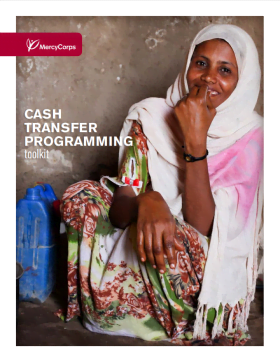
Cash Transfer Programming Toolkit
Guidelines and Tools
The Cash Transfer Programming (CTP) Toolkit is a basic guide to cash transfer programming in emergency response and early recovery settings. The publication is based upon best practiced and practical experience from Mercy Corps programmes. The Toolkit provides general guidance for CTP, as well as...
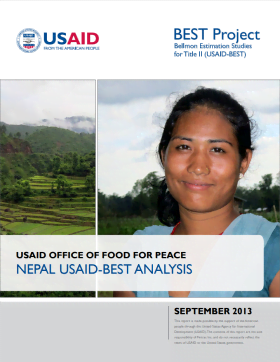
Nepal USAID-BEST Analysis
Report
During the months of July-August 2013, the Bellmon Estimation Studies for Title II (USAID-BEST) team undertook a study of the current state of agricultural markets in Nepal to inform USAID food assistance programming decisions. This USAID-BEST Analysis provides an overview of local markets,...

Transferencias electrónicas en situaciones de emergencia: guía práctica para su aplicación.
Guía y herramientas
La guía Transferencias electrónicas en situaciones de emergencia: Guía práctica para su aplicación está dirigida a los expertos sobre el terreno de las organizaciones humanitarias que trabajan en respuestas que incorporan transferencias en efectivo entregadas a través de sistemas de pago digital,...
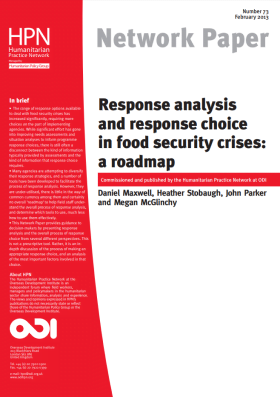
Response Analysis and Response Choice in Food Security Crises: A roadmap
Guidelines and Tools
The term ‘response analysis’ implies that response choices are made solely on the basis of evidence and analysis. However, many factors contribute to how agencies select a response, and ‘response choice’ does not always involve an evidence-based, analytical process. Recent research by The...

Gatekeepers in Mogadishu: Research Consultancy
Report
Since 2011 the Somalia Cash Consortium has been implementing large-scale unconditional cash transfers (UCTs) under the Food Assistance to Vulnerable Households in South Central Somalia. Members of the Consortium have been confronted with the challenge of having to negotiate security and access to IDP...
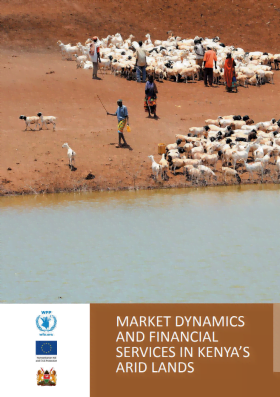
Markets dynamics and financial services in Kenya’s Arid and Semi-Arid Lands
Guidelines and Tools
The Vulnerability Analysis and Mapping (VAM) team of WFP recently finalised a market study on the Arid and Semi-Arid Lands (ASALs) of Kenya. The study explores market dynamics and financial service access for pastoral communities. This executive summary shortly presents the findings of this study. The...
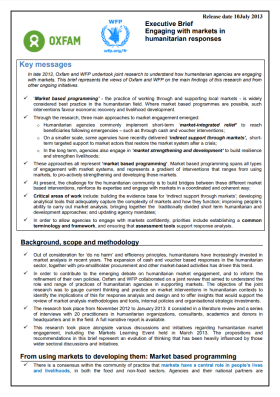
Executive Brief: Engaging with markets in humanitarian responses
Policy paper
In late 2012-early 2013, WFP and Oxfam collaborated on a piece of research that aimed to understand how humanitarian agencies are currently engaging with markets and how this work might evolve. The research culminated in the writing of this brief.
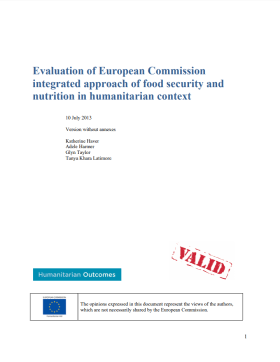
Evaluation of European Commission Integrated Approach of Food Security and Nutrition in Humanitarian Context
Report
The present evaluation was commissioned to assess DG ECHO’s operational capacity to fund integrated food security and nutrition operations in line with the Humanitarian Food Assistance Communication (2010) and related policies. It asks whether DG ECHO-funded food assistance supports, or perhaps hinders,...
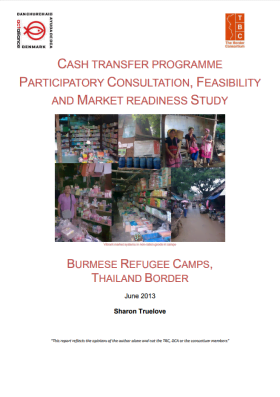
Cash Transfer Programme Participatory Consultation, Feasibility and Market Readiness Study: Burmese refugee camps, Thailand border
Report
This report is a participatory consultation, cash feasibility and market readiness study of the Burmese refugee camps on the Thailand border. It is a rapid, snap shot guide as to whether the conditions in two contrasting camps out of the full nine camps are conducive to a switch from the current ration...

Humanitarian Coalition East Africa Drought Appeal: Final Evaluation – Somalia
Case Study
In 2011, Somalia suffered from one of the worst droughts in 60 years which left more than 13 million people in need of food, water and emergency healthcare. Canadian donors contributed $14 million to the Humanitarian Coalition’s joint appeal for East Africa’s drought of 2011. These funds helped to...

Humanitarian Exchange: Special feature. New learning in cash transfer programming
Report
The special feature of this issue of Humanitarian Exchange, co-edited with Sarah Bailey and Breanna Ridsdel, focuses on new learning in cash transfer programming. While cash is now an accepted tool, and is increasingly being used in humanitarian response, most programmes are small and gaps in analysis and...
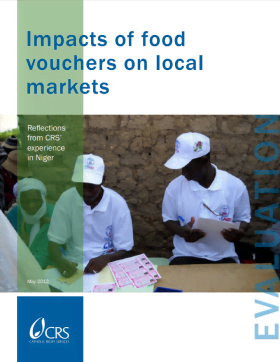
Impacts of Food Vouchers on Local Markets: Reflections from CRS’ experience in Niger
Report
In mid 2010, CRS-Niger designed and carried out a food voucher program to assist the most needy one-third of households in the departments of Ouallam and Tillabéri due to the poor harvest in 2009 (CRS, 2010). The ADVANCE project was implemented in collaboration with a local NGO partner Association pour...
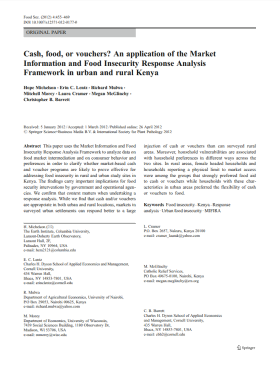
Cash, Food or Vouchers? An application of the market information and food insecurity response analysis framework in urban and rural Kenya
Policy paper
This paper uses the Market Information and Food Insecurity Response Analysis Framework to analyze data on food market intermediation and on consumer behavior and preferences in order to clarify whether market-based cash and voucher programs are likely to prove effective for addressing food insecurity...
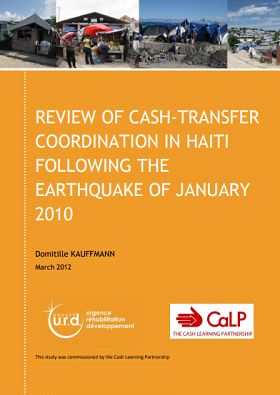
Review of Cash-transfer Coordination in Haiti following the Earthquake of January 2010
Case Study
This study, commissioned by the CALP Network, aims to review and document the coordination of cash transfer programmes (CTP) implemented from the emergency phase in Haiti. It is part of a wider review of CTP coordination in emergency situations which includes three case studies (Pakistan, Haiti and the...

Annex 1: Multi-Sector Market Assessment (MSMA)
Report
The Multi-Sector Market Assessment (MSMA) Annex is designed to help practitioners examine whether an affected target population can fairly and equitably access the expected amount of goods and services in
order to meet the objectives of the Multipurpose Cash Grant (MPG) programme.
The aim of the MSMA is...

An Emergency Market Mapping and Analysis study Changing Responses to the Haiti Earthquake
Report
Good practice standards guidelines and evaluations all emphasise the importance of including markets in emergency situation and response analysis. While this approach has become more widely accepted by international organisations in recent years, in practice it is clear that support is still needed to...
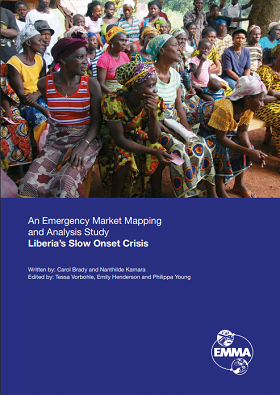
An Emergency Market Mapping and Analysis Study Liberia’s Slow Onset Crisis
Report
In 2010, contested elections in neighbouring Côte d’Ivoire, and the violence that ensued, forced hundreds of thousands of people from their homes. As of 7th of July 2011, the United Nations High Commissioner for Refugees (UNHCR) had counted a total of 153,000 refugees crossing the border into Liberia....
